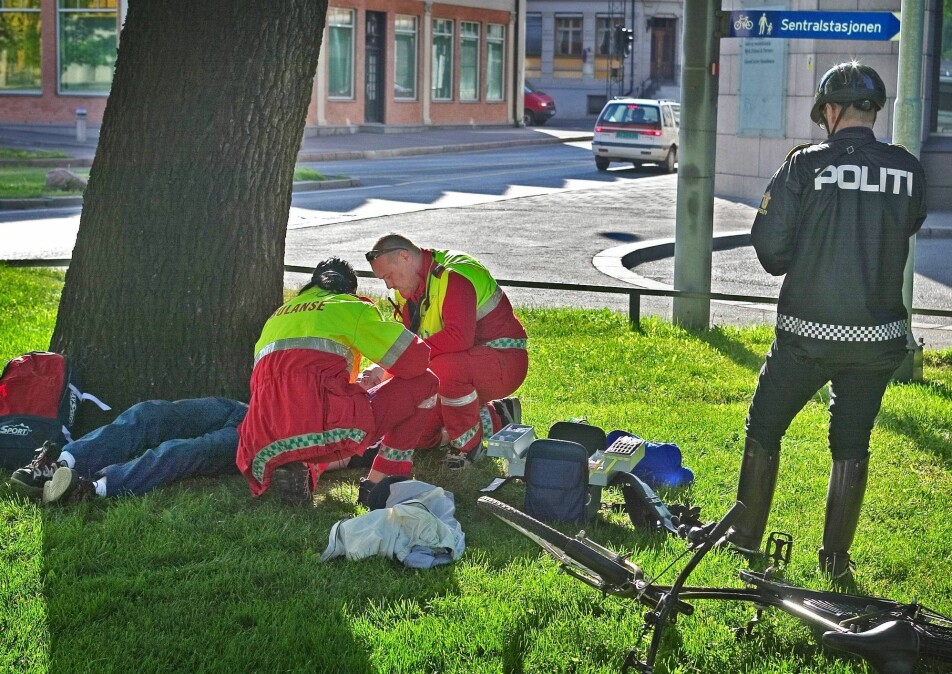
What distinguishes the men who buy sex from men who don’t?
Men who paid for sex were more often dissatisfied with their own sex lives.
Nine per cent of the men who responded to a new Swedish survey said they had paid for sex.
This percentage is roughly in line with figures from previous studies in the Nordic countries and in Western European countries, according to a recently published article in Archives of Sexual Behavior.
In a Norwegian study from 2010, almost 13 percent of men answered the same way. The researchers had analysed studies from 1992, 1997 and 2002.
Little good research is available on people who pay for sex, according to the researchers behind the new Swedish study.
They found no distinct differences in men's responses based on income or education level. But a couple of other characteristics seemed to stand out more among men who had bought sex, than among other men.
Men who paid for sex were more often dissatisfied with their own sex lives. A good number had used a lot of pornography, and several had engaged in sexual activity online, such as searching for sex partners.
Sought help to stop buying sex
The project Kast – Kjøp av seksuelle tjenester (Purchase of sexual services) – started in 2011 at the Reform Resource Center for Men in Oslo. Kast is a conversation and guidance service for people who buy sex.
Since its inception, hundreds of men and some women have made contact, according to the project's website.
Mali Storbækken is one of the supervisors they can talk to.
The vast majority of people who contact Kast want help to stop buying sex, she says.
“As a rule, people who get in touch with us are very clear that they want to quit,” says Storbækken.
Men often need to talk about buying sex. They need to put their feelings into words, according to Storbækken.

“Most people keep this activity a secret from the people around them, and they need someone to talk to,” she says.
Storbækken finds that the project fills an important void. The general health services aren't experts when it comes to prostitution and sexual health.
Many of the individuals who contact Kast feel a lot of guilt, Storbækken says.
“For some it’s a matter of addiction. Money problems also come up, because it costs a lot to buy sex. In addition, various relationship problems and possible break-ups factor in.
Escort websites and porn
In recent decades, much of the sex trade has moved online.
“Most of the people we talk to buy sex via escort sites. The first contact is established online and then moves to physical meetings, either in the apartment of the sellers or in a hotel. Many people also buy sex at massage parlours. Few of the people we talk to buy sex on the street,” says Storbækken.
Storbækken finds it interesting that the Swedish study suggests a link between porn use and the purchase of sex. In the Reform-project, men are asked questions about porn use. Many of them watch a lot of porn, she says. And men often say that online porn sites were their entry into buying sex.
“In terms of being in the process of changing practices, some men tell us that going to porn sites is very triggering, because from there they can enter sex purchase sites. And many of those we talk to define themselves as addicted to porn. They see a link between porn culture and their own sex purchase. They’re looking for a relationship that’s emotionally disconnected,” she says.
Why do some people buy sex?
The Swedish researchers based their study on a large health survey from 2017 that included both men and women aged 16 - 84.
Very few women said they had paid for sex. The researchers therefore chose to only analyse responses from the men, which came to around 6000 respondents.
Several of the men who had paid for sex were dissatisfied with their sex lives, including how often they had sex.
But not everyone who is dissatisfied with their sex life buys sex. So what else could be behind this finding? According to Storbækken’s conversations with the men in Kast, she says the answer is twofold.
“I’ve talked to several men who have regular intercourse with their partner, and who actually think they’re happy with their sex life and how often they have sex,” she says.
“These clients often explain the buying of sex with a certain excitement. They’re typically well-established men, with a family and children.”
“But then we also have men whose experience is that the intimacy and sex have disappeared from their partnership, or that they have different sexual preferences that they can’t fulfil with their partner. In those cases, we also offer couples therapy, if the person is open with their partner about their sex purchase,” says Storbækken.
Lots of different backgrounds
Research suggests that men who buy sex have wide-ranging backgrounds. But men who buy sex exhibit more of a tendency toward risk behaviours, for example in the use of alcohol and other drugs, according to the Swedish study.
The 2010 study from Norway indicated that being single, receiving disability benefits, an early sexual debut and multiple sex partners were more common traits among men who had bought sex than among other men.
The Swedish researchers found slightly more sex buyers in the group with the lowest income, compared with those having the highest income. But overall, education level and income bore little relevance in terms of who paid for sex.
Storbækken finds the latter to be the case among Kast participants as well.
“We meet men from all walks of life, from 18 to well over 70 years old. They come as singles and with partners and children, as men who are unemployed and as well-educated men in high positions,” she says.
“We’ve had several clients that fall into the highest income group, so you could well wonder if the study managed to capture all groups. I would say that most clients are in the socioeconomic middle group, but we also have some clients with lower and higher socioeconomic status.
One-time event or regular customer
The men who contact Kast have varying sex purchase stories, Storbækken says.
“Some men have bought sex once on a trip ‘with the boys’ to a country with a lot of visible prostitution and don’t recognize themselves in this act. Others have paid for sex often and over decades.
Many of the men who contact Kast are ashamed and have a bad conscience, she says.
“Often they have a partner and children, and then they have a guilty conscience. They may feel that they’re acting against their own morals, and that’s a bad feeling.”
In the Kast project, the supervisors often have numerous conversations with the men. Eventually, they are asked if they think they have met victims of human trafficking.
Many of the men have thought about whom they’re buying sex from, Storbækken says. A lot of men tell her about a set of rules they follow so they don’t buy sex from someone who is subjected to coercion.
“For example, they say that they won’t buy sex from anyone under a certain age, from someone on the street or from someone who’s intoxicated, or only from Norwegian people. These rules can be a way for a person to deal with their bad conscience.”
“Also, the awareness that buying sex can have consequences for the people they engage can contribute to helping men to stop buying sex,” Storbækken says.

Can become like other types of addiction
The reasons for buying sex aren’t the same for everyone.
For some, paying for sex can be like an intoxication they aren’t able to quit, and therefore they need help, says Haakon Aars.
Aars is a specialist in clinical sexology and works at the Institute for Clinical Sexology and Therapy in Oslo. He has written the book Menns seksualitet (Men's sexuality) and is a doctor and specialist in psychiatry and community medicine.
Since 2014, Aars has been associated with Kast as a supervisor in working with men who pay for sex.
“They may find it exciting, but then the buying of sex becomes a kind of addiction.
“Some men are in a relationship, but maybe not a good relationship. Some aren’t able to manage other areas of their life, some can’t find a partner and feel unsuccessful in trying to date. Buying sex can start to consume them, and many feel ashamed of it afterwards. Many men who are in relationships haven’t told anyone. They lie and keep it hidden. It becomes a bit like other types of addictions,” says Aars.
“A lot of people feel ashamed about buying sex, but not everyone does. Some think that they might be punished, or worry about spending money, or they’re afraid someone will discover them, and they don’t want to live their sex life that way,” he says.
Few women said they bought sex
The Swedish study did not capture whether the men bought sex from men or women.
Buying sex from men or boys is probably an even bigger taboo than buying sex from women, according to Aars.
Finding adequate answers to how many men buy sex from men and boys, and why, is difficult. Men and boys who sell sex are another group we know too little about, Aars says.
“Often young people who don’t belong are on the run. They gather at train stations and similar anonymous places and make money this way. Pro Sentret, which works with prostitutes, has reported that it’s difficult to reach these boys. Many of them sell sex for a while and then they drift away.”
Aars believes that many men who buy sex clearly need a conversation partner like a doctor or psychologist.
“A lot of men are probably lonely, but not necessarily miserably lonely. To talk a little stereotypically about us men: we often don’t find it easy to talk about our emotions. Buying sex can be a way to meet a need for intimacy,” says Aars.
“But even though so few women in the Swedish study responded that they had paid for sex, we know that women buy sex too,” says Aars.
Did changing the law have any effect?
The Swedish study found that older men bought sex to a greater extent than younger people.
Maybe this is because buying sex was banned in Sweden in 1999. But it could also be because older men had more time to buy sex than younger men did, according to the researchers.
One reason they believe it’s important to find out more about people who buy sex is to reduce the sex trade.
Storbækken at the Reform Resource Center for Men thinks the Swedish study is a good start.
“The authorities should put resources toward mapping general sexual health and also sex buying and selling experiences among the Norwegian population. It’s a taboo field and is larger and more complex than you might think,” she says.
“I think we need to care about the groups involved, instead of marginalizing and stigmatizing them, which won’t bring about any changes for those who buy or sell sex.”
“More specifically, I think it’s important to find out who the sex buyers are, whether anything has changed since 2002, and since the sex purchase law came, what the motivation for the sex purchase is and how many people want to stop paying for sex,” Storbækken says.
Translated by: Ingrid P. Nuse.
Read the Norwegian version of this article on forskning.no.
References:
C. Deogan et al: Are Men Who Buy Sex Different from Men Who Do Not?: Exploring Sex Life Characteristics Based on a Randomized Population Survey in Sweden. Archives of Sexual Behavior, 22 December 2020.
B. Schei, H. Stigum. A study of men who pay for sex, based on the Norwegian National Sex Surveys. Scandinavian Journal of Public Health, 2010. Abstract.
G. Priebe, C.G. Svedin, C. G. Sälja och köpa sex i Sverige 2011. Förekomst, hälsa och attityder: Delrapport 1 [To sell and buy sex in Sweden]. Linköping University Electronic Press. Abstract in Swedish.
































